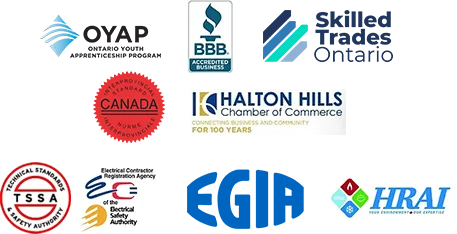When it comes to furnace replacement, many homeowners unknowingly make mistakes that can lead to inefficient heating, increased costs, and frequent repairs. Avoiding common pitfalls during furnace replacement can ensure that your new system operates reliably and efficiently for years to come. It’s crucial to understand these potential errors and how to prevent them.
Inadequate Assessment Before Furnace Replacement
A thorough assessment is crucial before deciding to replace your furnace. Many homeowners skip this step, leading to unnecessary expenses and improper system performance.
Proper System Evaluation
To start, ensure that our professionals conduct a comprehensive evaluation of your current furnace. This assessment checks for repairable issues, the efficiency of the existing system, and overall condition. Sometimes, a simple furnace repair may suffice, sparing you the cost of a full replacement. Evaluating your system thoroughly helps you make an informed decision, avoiding premature replacement.
Matching Furnace to Home Needs
It’s important to select the right furnace based on your home’s heating needs. The initial assessment helps determine the right size and type of furnace for your space. Installing an undersized or oversized furnace can lead to inefficiencies, higher energy bills, and frequent breakdowns. This evaluation ensures you choose a furnace that matches your specific needs, providing reliable and efficient heating.
Energy Efficiency Considerations
Assessing your home’s energy requirements can reveal whether an upgrade to a more energy-efficient model is beneficial. Our professionals take note of your home’s insulation, windows, and other factors affecting heating efficiency. This assessment can guide you toward selecting a furnace that aligns with your energy-saving goals, providing long-term cost savings.
Common Pitfalls in Heat Pump Installation
During heat pump installation, several common mistakes can occur. Being aware of these pitfalls can help you avoid them and ensure your system operates efficiently.
Improper Sizing
One major pitfall is choosing the wrong size heat pump. An improperly sized heat pump can lead to performance issues and higher energy costs. It’s vital to have our professionals perform accurate calculations to determine the ideal size for your home. Proper sizing ensures optimal performance and efficiency.
Incorrect Placement
The placement of your heat pump unit is crucial. Installing it in an area with poor ventilation, excessive sunlight, or restricted airflow can reduce its efficiency and increase wear and tear. Ensuring it is placed in a suitable location helps maintain its performance and extends its lifespan. Our professionals know the best practices for unit placement.
Poor Ductwork Design
Well-designed ductwork is essential for the effective operation of your heat pump. Poor design can lead to uneven heating or cooling, increased energy consumption, and higher operational costs. Ensuring your ductwork is properly designed and sealed is key to avoiding these issues. Our technicians can evaluate and rectify any ductwork concerns.
Neglecting Professional Installation
Another common mistake is attempting DIY installation or hiring unqualified technicians. Proper heat pump installation requires expertise and experience. Relying on our professionals ensures the job is done correctly, adhering to safety standards and manufacturer guidelines.
By understanding these common pitfalls and taking steps to avoid them, you can ensure a successful heat pump installation, providing reliable and efficient heating and cooling for your home.
Overlooking Boiler Replacement Timing
Delaying boiler replacement can lead to several issues that affect your home’s heating efficiency and safety. Recognizing the signs that it’s time for a replacement can help avoid these pitfalls.
Increased Risk of Breakdowns
One of the dangers of postponing boiler replacement is the increased likelihood of breakdowns. An aging boiler will struggle to perform efficiently, leading to frequent failures. These breakdowns can leave your home without heat during critical times, causing discomfort and potential damage to pipes due to freezing temperatures.
Higher Energy Bills
Older boilers typically consume more energy, which can significantly increase your utility bills. As the system ages, it becomes less efficient, requiring more fuel to provide the same amount of heat. Replacing an old boiler with a modern, energy-efficient model can reduce your energy consumption and lower your bills.
Safety Concerns
An outdated boiler can pose safety risks, including carbon monoxide leaks. Carbon monoxide is a dangerous gas that can lead to severe health issues or even fatalities. Regular inspections and timely replacements by our professionals can ensure your boiler operates safely, protecting your family from potential hazards.
Indicators for Replacement
Common signs that indicate it’s time to replace your boiler include strange noises, frequent repairs, uneven heating, and yellow flames instead of blue. Noticing these signs early and taking action can prevent significant problems down the line, ensuring your home remains warm and safe.
Mistakes When Choosing an HVAC Company for Furnace Replacement
Selecting the right HVAC company for your furnace replacement is critical. Many homeowners make common errors that can lead to poor service and inefficient furnace operation.
Choosing Based on Price Alone
One of the most common mistakes is choosing an HVAC company solely based on price. While it’s essential to stay within budget, excessively low prices can indicate substandard service or inexperienced technicians. Prioritize quality and experience over cost to ensure your furnace replacement is done correctly.
Ignoring Credentials and Experience
Another error is failing to check the credentials and experience of the company. Ensure that the technicians are certified and have sufficient experience with furnace replacement. Experienced professionals like ours are more likely to install your furnace correctly, ensuring optimal performance and longevity.
Not Reading Reviews or Asking for References
Skipping the step of reading reviews or asking for references can lead to hiring an unreliable company. Look for testimonials or request references from past clients to gauge the quality of service. Satisfied customers are a good indicator of a trustworthy HVAC company.
Overlooking Warranty and After-Sales Service
Many homeowners overlook the importance of warranty and after-sales service. Ensure the company offers a solid warranty on their work and stands by their services. This guarantees that any potential issues post-installation will be handled promptly and professionally.
Failing to Get a Written Estimate
Always get a written estimate before proceeding with the work. Verbal agreements can lead to misunderstandings and unexpected costs. A written estimate provides transparency and helps avoid surprises once the job is done.
Conclusion
Avoiding common errors during furnace replacement and other heating system upgrades can save you time, money, and discomfort. The importance of a thorough assessment before furnace replacement, understanding pitfalls during heat pump installation, recognizing the right time for boiler replacement, and carefully selecting an HVAC company cannot be overstated.
Taking these steps ensures that your heating systems operate efficiently and reliably, providing you with peace of mind and comfort throughout the colder months. It’s always advisable to rely on experienced professionals for assessments, installations, and replacements. This not only enhances the longevity of your systems but also safeguards against potential hazards and inefficiencies.
If you’re considering a furnace replacement service in Georgetown, trust our experts at Brooks Heating & Air. Our team of trained professionals is committed to providing top-notch services that ensure your home stays warm and energy-efficient. Contact us today to schedule a consultation and ensure your heating systems are in optimal condition.






